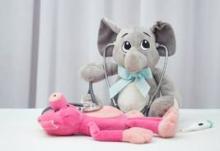As a pediatrician I’m flattered that this year’s top-selling Christmas gifts include Mattel’s Little Mommy Doctor Mommy Doll. But I have...questions. For example, is it a doctor doll for little mommies or a mommy doll for little doctors or a little doll for mommy doctor mommies? Also, the doll is shown with accompanying stethoscope, tongue depressor, thermometer, and reflex hammer, but where is the tablet computer? And if two friends play with the doll, does one get to be the Little Mommy Doctor and the other the Meaningful Use Implementation Consultant? If you disagree with the Little Mommy Doctor Mommy Doll, can you get a second opinion from Doc McStuffins?
Adrenaline Junkies
Nothing makes me angrier than working forever to master something, and then suddenly it’s irrelevant, like last week, when I finally “got” the Macarena. Now it looks like asthma management may be next. Not only is there a movement afoot to use inhaled corticosteroids (ICS) on an as-needed basis, but now a group of endocrinologists in South Africa is questioning whether chronic daily use of ICS may actually make asthma worse for some patients. To these diligent, groundbreaking researchers I say, “Shut up already!”
In what has to be the most scientifically complex, statistically dense publication I’ve ever tried to make fun of, a group of researchers evaluated endocrine function in patients taking ICS alone or in combination with nasal steroids (NS) for allergic rhinitis. They found that as many as 2/3 of patients on these medications had some hypothalamic-pituitary-adrenal axis suppression (HPAS) and also that if you say hypothalamic-pituitary-adrenal axis three times fast it sounds like you’re cursing. Some of these patients lose so much adrenal function they suffer low cortisol levels, which in theory could worsen the very disease we’re treating. The bottom line? Next time a parent asks me if all these steroids I’m prescribing have any side effects, instead of answering I’m just going to break out the Macarena.
That Certain Glow
A newly published evaluation of diagnostic imaging demonstrates a dramatic rise in the use of ionizing radiation to evaluate children’s medical conditions between 2001 and 2009, a trend that should only concern people who don’t like cancer. Older boys were more likely to get x-rays and CT scans than other children; the top complaints resulting in radiation exposure were abdominal pain, headache, and head injury. There is only one conclusion we can reasonably draw from this study: it’s getting progressively more difficult to diagnose children using a history and physical exam.
The authors don’t even offer a theory as to what makes kids so much harder to diagnose these days, but I have three ideas. First and most obvious, the obesity epidemic. As US kids have grown heavier it’s become almost impossible to feel around on them and listen to their hearts, much less to check their reflexes! Who knows what’s in there? Second, screen time. Today’s kids are too distracted by their Nintendos, Play Stations, and iPhones to answer questions like, “Where does it hurt?” and, “What makes it worse?”. Third, global warming. The study was conducted in San Diego, and really, who can work through a differential diagnosis when it’s just so darn hot? I can barely get it together to dance one chorus of the Macarena.
For Crying Out Loud
This week’s candidate for Most Interesting Article I Hope No One Reads appears in the journal Autism Research. Investigators used sophisticated video monitoring and audio analysis to determine that six-month-old infants who go on to develop autism have higher-pitched cries in response to pain than other babies. These data are intriguing, and they mesh nicely with other studies of crying and neurologic disease, but I’m worried about the impact these results may have on the already-stressed parents I see every day. If this gets out in the mainstream press it will only be a few days before I have mothers and fathers pinching their babies' toes and asking me if I think that cry sounds normal. If that happens, I swear I will refer them directly to the authors of the article (you can’t hide SJ Sheinkopf, et al). Failing that, I’ll consult my new partner, Doctor Little Mommy Doctor Mommy Doll.
David L. Hill, M.D, FAAP, is vice president of Cape Fear Pediatrics in Wilmington, NC and is an adjunct assistant professor of pediatrics at the University of North Carolina at Chapel Hill. He is Program Director for the AAP Council on Communications and Media and an executive committee member of the North Carolina Pediatric Society. He has recorded commentaries for NPR's All Things Considered and provided content for various print, television and Internet outlets. Dr. Hill is the author of Dad to Dad: Parenting Like A Pro (AAP Publishing 2012).


